Source: mnn.com
Published: April 22, 2013
This electric-assist tricycle is ready to win hearts and take on the city streets. Here’s how a veteran of the luxury car market is making his vision a reality.
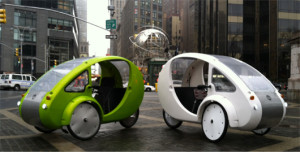
Photo: Organic Transit
By Sami Grover
Walking into the headquarters of Organic Transit, a North Carolina-based developer of what it calls “the most efficient vehicles on the planet,” I was struck by a decidedly disorienting feeling.
At first glance it was hard to put my finger on where that feeling was coming from. And then it hit me.
People were actually making things.
In a world where manufacturing is so often automated or outsourced to the other side of the world, it’s quite remarkable to see a team welding, assembling and tinkering with a fleet of futuristic-looking pedal electric hybrid vehicles.
Early success
Based out of a former furniture showroom in the heart of downtown Durham, it’s early days yet for Organic Transit, which closed out a highly successful Kickstarter funding drive in January 2013. Orders are coming in, distribution deals are being struck, and there is talk of opening additional manufacturing facilities, both on the West Coast and in Europe.
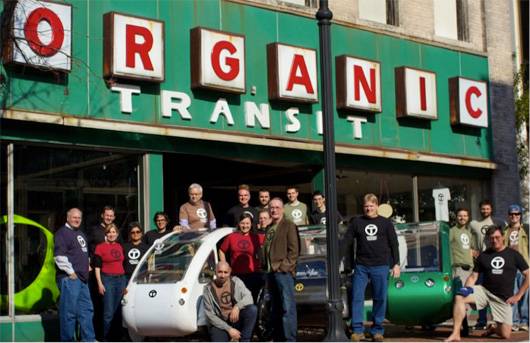
Photo: Organic Transit
The brainchild of Rob Cotter, a refugee from the automotive industry, Organic Transit’s inaugural offering is the tear-shaped ELF: a tricycle built with a 45 percent recycled aluminum frame and equipped with a weatherproof 80 percent recycled composite shell, an electric-assist drivetrain, a solar panel for charging the battery, LED headlights, tail lights, turn signals, and even an impressively loud horn to warn people you are coming. There’s even a smart phone/tablet app in development that will provide data on battery use, calories burned, route optimization and allow owners to connect with other ELF users in their area.
. A product of the times
While the ELF itself may only just be making its way onto the market, the idea has been forming for quite some time, as Cotter explains:
“I was working for Porsche, BMW and Mercedes back in the ’80s and was getting disillusioned with the industry. Meanwhile, projects like the Gossamer Condor — the world’s first human-powered aircraft capable of sustained and controlled flight — were being developed just down the road from me. I realized there were opportunities to rethink transportation.”
Cotter began designing human-powered vehicles, including a 62 mph tricycle, and eventually became VP of the Human Powered Vehicle Association. The success of vehicles like Cotter’s trike and the Gossamer Condor may have served as proof of concept in terms of performance, but Cotter says that market demand and potential for adoption were quite another matter:
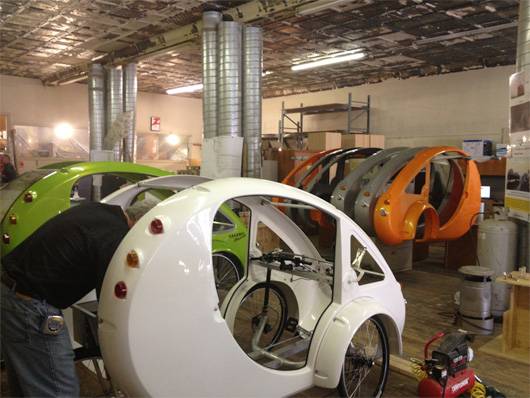
Photo: Organic Transit
“We could have built a vehicle like the ELF decades ago, for the most part. Advances in battery technology, LEDs and solar have certainly helped us, but we solved the primary challenge of building really light, durable and functional vehicles decades ago. The trouble was that people had no interest in efficiency throughout the ‘90s. They wanted SUVs, they wanted minivans, and they wanted luxury. Mpgs were irrelevant.”
A bike for the reluctant biker?
An increasingly urban culture, coupled with rising awareness about resource depletion and global climate change, may be about to change all of that. Following a stint in the corporate social responsibility sector, Cotter began exploring the possibility of a velomobile, or pedal-powered vehicle, aimed squarely at the urban commuter market:
“The bike industry is huge in the U.S., but it is largely geared toward recreation and sport. We know there are vast numbers of people who would be interested in biking, but they are concerned about safety, convenience, or they simply don’t want to turn up to work in sweaty Lycra. If we can get a fraction of that market, we’ll be home dry.”
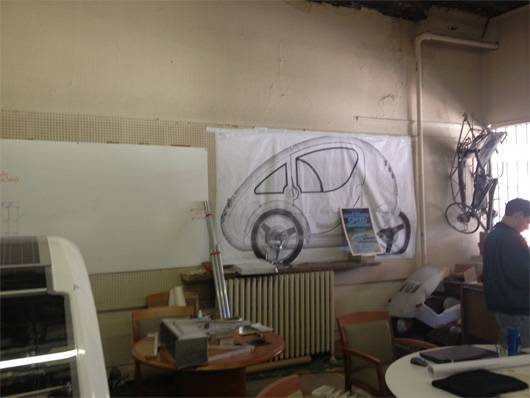
Photo: Organic Transit
Safety, visibility, comfort
Working collaboratively with a team of designers and bike builders, Cotter developed designs and began building models and prototypes. From the beginning, the idea was to create a stable, safe, highly visible and easy-to-use vehicle that could hold its own in city traffic, while still being able to go everywhere that a regular bike would go.
The next step was to secure funding. Despite offers from institutional investors, Organic Transit was always concerned about finding funders who shared the group’s vision, not just its profits. Following an initial round of funding from angel investors, which allowed Cotter to build the first ELF in April 2012, Cotter then turned to Kickstarter with a goal of raising $100,000 to build the first 100 vehicles, as explained in the video below.
Crowdfunding raises $225,000
The campaign far exceeded expectations, raising $225,789 by January 2013, and selling more than 50 vehicles in the process. The funding was enough to hire employees (the company currently employs 18 people), recruit interns, and begin building vehicles that would actually be hitting the road. Since then, the company has sold 50 more vehicles, secured distribution deals in Europe, and entered discussions with corporate clients interested in the TruckIt — a cousin of the ELF designed for the light delivery market.
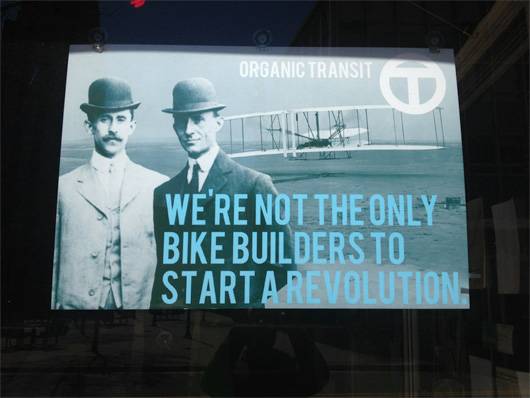
Photo: Organic Transit
Distributed manufacturing
Organic Transit is in the process of expanding to a second warehouse in downtown Durham, and is developing a model for distributed manufacturing facilities that will harness local materials and labor in an effort to keep the company’s carbon footprint and costs to a minimum. The Amsterdam arm of Organic Transit will even be working with troubled youths to train them in assembly and light manufacturing:
“We’re watching the cost of Chinese labor and fossil fuels going up, while unemployment in the West is at critical levels. We’re riding that wave, and aiming to build a radically different business model that will keep our costs and environmental impact down.”
Competitive pricing
The base price of the ELF is $4,000 — certainly not cheap compared to your basic bicycle, but comparable to many high-end models, and extremely competitive with other velomobiles that often retail for upwards of $10,000. Given the added benefits of solar electric assist, weather protection, cargo and even passenger-carrying capabilities, and a design that should require minimal maintenance, Cotter is confident there is a market at this price point:
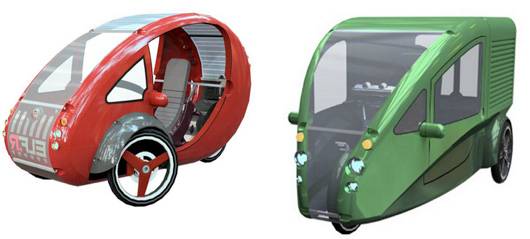
Photo: Organic Transit
“We’re not really aiming for the cyclist who would be biking anyway, although there are those bikers who might use the ELF as a bad weather alternative. We really want to reach those people who would otherwise be using their cars. There are very few things that a small business could do that could have an equivalent environmental impact at the kind of costs we are talking about.”
A unique, addictive ride
Having now ridden the ELF myself, I am convinced that Cotter may be onto something. On a warm North Carolina afternoon, I was able to move safely and easily through city traffic without breaking a sweat, despite a heavy jacket, and felt confident and safe turning corners, navigating intersections and pulling up onto the sidewalk when needed. The experience was nothing like riding a bike, and little like driving a car either. Yet it felt like a comfortable and practical alternative for getting around in an urban environment. Crucially, the experience is also a lot of fun, especially when the electric assist kicks in and you speed uphill past curious onlookers.
“The throttle is a little like a drug, isn’t it?” laughed Cotter as I pulled back up to the showroom.
“It’s hard not to use it when you first get in. But the funny thing is over time, you actually find yourself pedaling 40 percent of the time, using the throttle maybe 25 percent of the time, but the rest of the time you’re just coasting. You’re using no energy at all.”
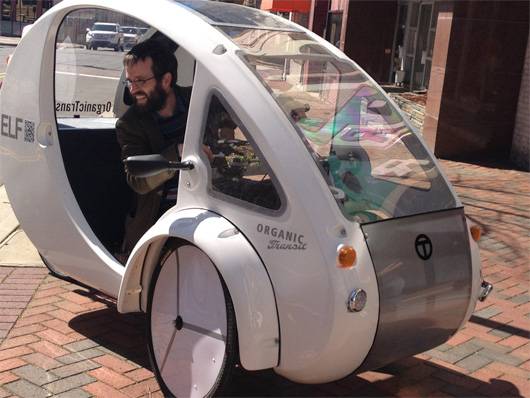
The writer had a lot of fun on his test drive. (Photo: Rob Cotter/Organix Transit)
That, Cotter hopes, is an experience he can sell.
